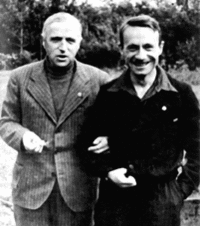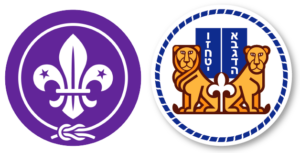Edmond Flegenheimer better known as Edmond Fleg (26 November 1874, Geneva – 15 October 1963, Paris) was a Jewish French writer, thinker, novelist, essayist and playwright of the 20th century.
After fighting in the Foreign Legion during the First World War, he spent his life improving his knowledge of Judaism and sharing this through his writing. He is the author of many works in a variety of genres. He translated a part of the Bible into French: Genesis in 1946 and Exodus in 1963.
 In 1935, Robert Gamzon (right) met Edmond Fleg to offer him the presidency of his young Jewish Scout Movement (EIF – Éclaireurs israélites de France), which he had founded twelve years earlier. At that time, the latter was enjoying his most productive artistic period.
In 1935, Robert Gamzon (right) met Edmond Fleg to offer him the presidency of his young Jewish Scout Movement (EIF – Éclaireurs israélites de France), which he had founded twelve years earlier. At that time, the latter was enjoying his most productive artistic period.
Edmond Fleg accepted, declaring: “all Jewish children, whatever their Jewish family education, must be able to become a Jewish boy scout; there can be no barriers.”
From that moment on, he became the inspiration and adviser of the young founder, Robert Gamzon. For many years he reinforced their inclusive and pluralist educational programme, which right to this day enables young Jews from all social backgrounds and all strains of Judaism to experience together in their scouting activities the proclaimed unity of the Jewish People.
Around then, a new title added itself to the literary and artistic glory of Edmond Fleg, that of “Chef Fleg”.
“May the youthful creativity of the Eternal pervade your every moment”, he wrote to his scouts, in the crucial period of the Occupation, during the Second World War. “Never in your religious practice, nor in relations with your family or friends, nor in the accomplishment of your duties as citizens or men, nor in your most humble work, nor in your most humble pleasure, may the cold mechanisms of habit extinguish in you the creative spark which was lit by the reflection of the divine.”
Edmond Fleg’s two young sons died tragically in 1940, almost at the same time, one at the front, and the other in Paris. Edmond Fleg’s grandson “who was not yet born” (a dedication to his essay written in 1928 “Why I am a Jew”) and who would never be born, for whom the writer and his companion mourned in silence and dignity, found himself compensated for and sublimated by the young Jewish scouts of France.
With his complete filial affection and total spiritual commitment, Robert Gamzon brought to the master, hundreds and thousands of grandsons who today still sing the movement’s national hymn, whose words were written by Fleg.
Edmond Fleg founded “Amitié Judéo-Chrétienne de France” together with Jules Isaac in 1948. He also became a post-war member of the « Alliance israélite universelle ».
In Paris in 2013, the Éclaireuses éclaireurs israélites de France (EEIF – Jewish Scouts of France) celebrated the 50th anniversary of the death of « Chef Fleg. »
« Why I am a Jew » is an essay that describes the thoughts and feelings of a man estranged from his Judaism as he comes to embrace his religion with fervor. Edmond Fleg first published this book in 1928 when he was 54 years old and living in Paris.
He poses an interesting question: « Was Judaism essentially revolutionary? If moral, social and international progress mean revolution—yes; but not if revolution implies violence. » A conclusion: « I came to realize that anti-Semitism had only one seemingly valid ground: the determination of Jews to remain Jews. »
At the very end of the book there are 12 statements that all begin « I am a jew because… »
Je suis juif, parce que, né d’Israël, et l’ayant perdu, je l’ai senti revivre en moi, plus vivant que moi-même.
I am a Jew because born of Israel and having lost it, I feel it revive within me more alive than I am myself.
Je suis juif, parce que, né d’Israël, et l’ayant retrouvé, je veux qu’il vive après moi, plus vivant qu’en moi-même.
I am a Jew because born of Israel and having found it again, I would have it live after me even more alive that it is within me.
Je suis juif, parce que la foi d’Israël n’exige de mon esprit aucune abdication.
I am a Jew because the faith of Israel requires no abdication of my mind.
Je suis juif, parce que la foi d’Israël réclame de mon cœur toutes les abnégations.
I am a Jew because the faith of Israel asks any possible sacrifice of my soul.
Je suis juif, parce qu’en tous lieux où pleure une souffrance, le juif pleure.
I am a Jew because in all places where there are tears and suffering the Jew weeps.
Je suis juif parce qu’en tous temps où crie une désespérance, le juif espère.
I am a Jew because in every age when the cry of despair is heard the Jew hopes.
Je suis juif, parce que la parole d’Israël est la plus ancienne et la plus nouvelle.
I am a Jew because the message of Israel is the most ancient and the most modern.
Je suis juif, parce que la promesse d’Israël est la promesse universelle.
I am a Jew because Israel’s promise is a universal promise.
Je suis juif, parce que, pour Israël, le monde n’est pas achevé : les hommes l’achèvent.
I am a Jew because for Israel the world is not finished; men will complete it.
Je suis juif, parce que, pour Israël, l’Homme n’est pas créé : les hommes le créent.
I am a Jew because for Israel man is not yet completed; men are completing him.
Je suis juif, parce qu’au-dessus des nations et d’Israël, Israël place l’Homme et son Unité.
I am a Jew because Israel places Man and his unity above nations and above Israel itself.
Je suis juif, parce qu’au-dessus de l’Homme, image de la divine Unité, Israël place l’Unité divine, et sa divinité.
I am a Jew because above Man, the image of the Divine Unity, Israel places the unity which is divine.

Tsofim Yehudim, LeDor VaDor
Jewish Scouts, from generation to generation